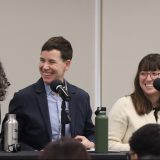Working for Racial Justice and Human Rights Engaging the World: Leading the Conversation on the Significance of Race
November 17, 2020
On the eve of the 2020 US Presidential Election, Dr. Lisa Leitz, Professor and Director of Peace Studies hosted a well-attended discussion with Peace Studies faculty as part of Wilkinson’s Engaging the World: Leading the Conversation on the Significance of Race. Leitz was joined by Chapman Presidential Fellow Prexy Nesbitt, Associate Professor Claudia Fuentes-Julio, and Dr. Ahmed Younis, a former Principal Deputy Assistant Secretary of State. While anxiety across the nation was high, the evening served as an opportunity for hopefulness of spirit and depth of substantive investigation. The night offered a unique closeness of hearts and minds that the distancing of bodies could not overcome.
One of the challenges of modern education is the real or perceived division between domestic and international relations. When students grapple with domestic instability and communal confusion, they are seldom encouraged to look around the world for solutions. When an American student thinks of race, they often only think of America – or more specifically, the America they know. When they think of peace or peace-making, they think of somewhere other than America. In Peace Studies we work to bridge these gaps by teaching both theory and the lived realities of humans at home and around the world.
Dr. Nesbitt began his intervention by recalling his early days of advocacy from Chicago to South Africa, and the many faces and persuasions of anti-racism globally. He recalled early on in his career a knife was put to his neck by someone who would later become a confidant and organizing collaborator on the streets. From Sri Lanka to Guatemala, between Irish Nuns and armed revolutionaries, students and guests were taken on a journey to hope through the waters of humanity. Dr. Nesbitt ended with his strong hope in the current generation of students and activists as catalysts for positive social change.
Dr. Fuentes-Julio joined the discussion from Santiago, Chile where her work has focused on human rights and constitutional reform. Bolstered by data from the inter-American Commission on Human Rights, Dr. Fuentes-Julio elucidated the history of African descendants of Latin America as a whole and the discrimination and exclusion they face today as a group of 133 million people. “Every single day, a black Brazilian is killed every 23 minutes,” she noted. She also pointed to the intersectional nature of oppression throughout the region by highlighting that Latin America has the highest rate of femicide in the world. Police violence and state sanctioned violence are key catalysts to socio-economic instability and thus political stagnation in the region.
Dr. Ahmed Younis, who is also an instructor in Peace & International Studies, ended the conversation by pointing to the liquidity of identity and race throughout the world. Marshaling examples like the Genocide of Rohyingas in Myanmar and Uihgurs in China, and the killing of Jamal Khoshoggi by the Saudi government in a Consulate in Turkey’s capital city, Dr. Younis pointed to global silence. “Why does it fall upon The Gambia to fight for Rohyingas in the International Court of Justice? Where are the world’s moral leaders?,” he asked. “As the world looks for centering, leading with an ethical foundation in the global community with an eye to re-asserting human rights and humanitarian norms will be the first business of the Biden Administration,” he concluded.
Would you like to hear more about this discussion? Watch the Zoom recording here!





